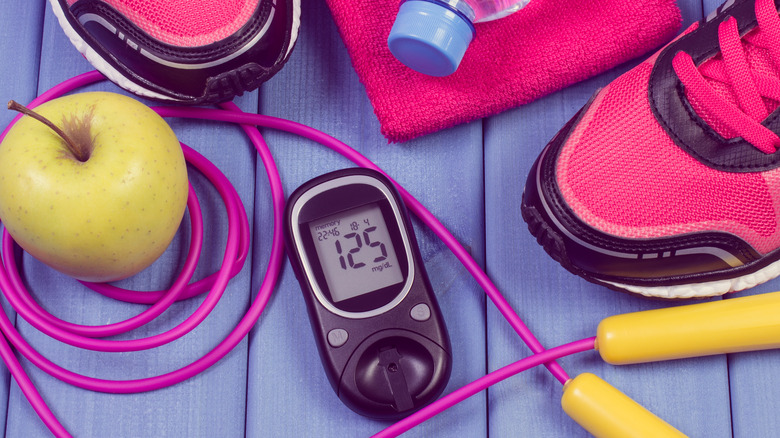Is There A Link Between Diabetes And Anemia?
If you have diabetes, you probably have to visit the doctor often to be tested for a variety of other health conditions. Diabetes can increase your risk of developing many other health conditions, including anemia (via WebMD). Anemia is a condition in which your blood doesn't have enough healthy red blood cells, which carry oxygen to all parts of your body. There are many different types of anemia, each with its own cause. Diabetes can cause anemia by damaging the kidneys. The kidneys produce a hormone called erythropoietin (EPO). EPO signals the bone marrow to make more red blood cells. When the kidneys are damaged, they don't make enough EPO and as a result, the bone marrow doesn't make enough red blood cells.
Anemia can also be caused by some medications used to treat diabetes. Some of these drugs include ACE inhibitors, fibrates, metformin, and thiazolidinediones. If you have diabetes and think you might have anemia, see your doctor. Anemia can be treated with medication or dietary supplements. If you have anemia, you'll need to be closely monitored by your doctor to ensure that your condition doesn't worsen.
What to know about diabetes
Diabetes is a condition in which the body cannot properly process sugar. Sugar is an important source of energy for the body, and the pancreas produces a hormone called insulin to help convert sugar into energy. However, in people with diabetes, either the pancreas does not produce enough insulin or the body cannot effectively use the insulin that is produced. As a result, sugar builds up in the blood instead of being used for energy (via Healthline).
Over time, high blood sugar can lead to serious health problems such as heart disease, stroke, kidney damage, nerve damage, and vision loss. There are two main types of diabetes: type 1 and type 2. Type 1 diabetes is usually diagnosed in children or young adults, while type 2 diabetes is most common in adults over the age of 40. However, type 2 diabetes is on the rise in children and teens due to obesity.
The symptoms of diabetes can vary depending on how high the blood sugar level is. Some people with diabetes may not have any symptoms at all. In general, the early symptoms of untreated diabetes include frequent urination, unusual thirst, feeling tired all the time, and slow healing of cuts and bruises. If blood sugar levels continue to rise, other symptoms may include weight loss, constant hunger, confusion, blurred vision, and numbness or tingling in the hands and feet.
What to know about anemia
Even if you don't have diabetes, it is important to be aware of the risks and symptoms of anemia. Anemia is a condition in which there is a decrease in the number of red blood cells or hemoglobin in the blood. This can lead to fatigue, pale skin, shortness of breath, and other symptoms (via Mayo Clinic). There are several different types of anemia, but the most common type is iron deficiency anemia. This happens when there is not enough iron in the diet or if the body is unable to absorb iron properly. Iron is necessary for making hemoglobin, so without enough iron, the body can't make enough hemoglobin and red blood cells.
Iron deficiency anemia can be caused by blood loss, pregnancy, or certain medical conditions such as celiac disease or inflammatory bowel disease. Treatment typically involves taking iron supplements and eating foods that are rich in iron such as meat, poultry, fish, beans, and dark leafy greens. If you think you might have anemia, talk to your doctor. They can order a blood test to check your hemoglobin levels. Anemia is treated differently depending on the cause, so it's important to get an accurate diagnosis. With treatment, most people with anemia can lead healthy lives.



